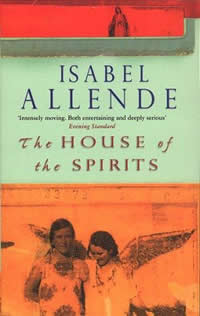The reality of the present was a kaleidoscope of jumbled mirrors

The House of the Spirits
by Isabel Allende
translated from Spanish by Magda Bogin
I had been meaning to read Isabel Allende for years, so I heartily encouraged this book-club choice. I knew absolutely nothing about it going in but I did know a little about the author and it was interesting how that coloured my reading, especially toward the end of the book.
This is both a family saga and the tale of a country over the span of 70 or so years, beginning at the start of the 20th century. The country is clearly Chile though it’s never named. The characters – beginning with Clara del Valle as the youngest child of a large, wealthy family – and their lives are described by two narrators, one of whose identity becomes clear early on and another whose identity is not revealed until the epilogue. The longest-lived character – and therefore in some ways the largest presence in the book – is Esteban Trueba, whom I found inscrutable. He’s not hugely likeable but he’s also not 100% bad; he has genuine complexity that makes him difficult to write off or ignore.
In fact, that’s true of all the characters, despite the many stories packed in here and the sometimes extreme views depicted, they remain believably human. The family is not a metaphor – they’re well-drawn characters with shades of grey and sometimes confused loyalties – but they do represent types of people in Chile to an extent – rich landowner, activist student, charitable middle class, etc.
“She was one of those people who are born for the greatness of a single love, for exaggerated hatred, for apocalyptic vengeance, and for the most sublime forms of heroism, but she was unable to shape her fate to the dimensions of her amorous vocation, so it was lived out as something flat and gray trapped between her mother’s sick room walls.”
In the beginning I found this book funny, charming and lovely, but then we get some shocking scenes – such as Esteban Trueba mistreating his farm tenants – that remind you that this is a book with a political agenda. Not that it’s rammed home at the cost of good storytelling, by any means, but I did find that the novel moved a little uneasily from family story with politics in the background to an overtly political story with the few remaining family members directly involved in the politics.
“She felt that everything was made of glass, as fragile as a sigh, and that the machine-gun fire and bombs of that unforgettable Tuesday had destroyed most of what she knew, and that all the rest had been smashed to pieces and spattered with blood.”
This book is an often-cited example of magical realism and it certainly starts with lots of magical/fantasy elements but they fade away until they’re only a memory of the surviving characters. Which I suppose forms part of the political message getting darker and more overt as the book goes on. But perhaps the magic is also part of the old way of life, which has been lost irretrievably.
“Childhood came to an end and she entered her youth within the walls of her house in a world of terrifying stories and calm silences. It was a world in which time was not marked by calendars or watches and objects had a life of their own, in which apparitions sat at the table and conversed with human beings, the past and future formed part of a single unit, and the reality of the present was a kaleidoscope of jumbled mirrors where everything and anything could happen.”
I did feel that the earlier politics was dealt with more subtly, with distance, whereas the later politics felt much more angry and personal. This reflects to some extent the characters who are the two narrators, but it also seemed a lot like Allende’s own anger, which would certainly be understandable. And the end section of the book is certainly gripping – probably the only section that truly is – but it felt like a very different novel, at times hardly even a novel but more an account of Chile in the 1970s.
We all agreed at book group that this novel is very readable, though it’s not one to rush through. And it is perhaps a little overlong – it could easily have been trimmed. But overall it’s enjoyable, and I am interested in reading more Allende.
La casa de los espíritus published 1982 by Plaza & Janés.
This translation published 1985 by Jonathan Cape/Alfred A Knopf.
Source: Waterstones Bristol.
Challenges: This counts towards the Rory Gilmore Reading Challenge.